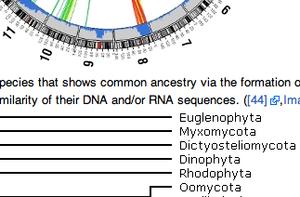Difference between revisions of "Eric"
| Line 1: | Line 1: | ||
January 19th Lab Methods in Genomics | January 19th Lab Methods in Genomics | ||
| + | |||
| + | [http://www.ds-health.com/trisomy.htm Story of Trisomy 21] | ||
<center> | <center> | ||
| Line 25: | Line 27: | ||
Ts65Dn is the mouse model for trisomy 21 in humans | Ts65Dn is the mouse model for trisomy 21 in humans | ||
| + | |||
| + | distal= further away from the centromere | ||
| + | |||
| + | Think that chromosome 16 and 17 were combined via NHEJ but there is a small overlap region of 7 bp that might have had a role in determining the 16/17 breakpoint | ||
Revision as of 15:19, 31 January 2017
January 19th Lab Methods in Genomics
Ts65DnDown Syndrome mouse model
T1DS/T2N -twin 1 down syndrome/twin 2 normal
MZ1/MZ2
-supernumerary
RPKM-reads per kilobase million -gives you a normal for comparison
LADs are overtranscribed in down syndrome when they should have low expression
Think replication time and transcription levels are correlated, genes transcribed earlier are expressed lower and later transcribed are more expressed
Not just the overexpression of chromosome 21. It is the consequence of these products causing the LADs to be expressed higher. Effects of changing chromatin structure
1/31
Molecular characterization of Ts65Dn
Ts65Dn is the mouse model for trisomy 21 in humans
distal= further away from the centromere
Think that chromosome 16 and 17 were combined via NHEJ but there is a small overlap region of 7 bp that might have had a role in determining the 16/17 breakpoint
